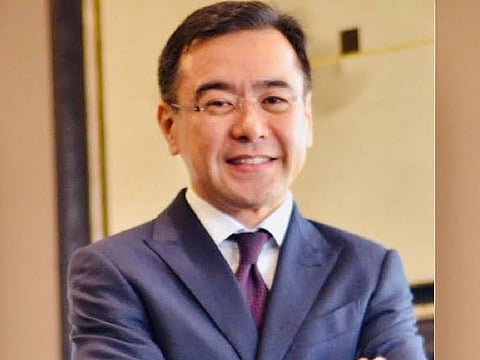Philippines: New chief of $2 billion Maharlika fund sets agenda
Rafael Jose "Joel" Consing Jr. shares vision for nation's first sovereign wealth fund

Manila: In a pivotal moment for the Philippines' inaugural sovereign wealth fund (SWF), Rafael Jose "Joel" Consing Jr., a Stanford-educated business executive, has assumed the role of President and CEO at Maharlika Investment Corp. (MIC).
Bringing a wealth of experience, Consing Jr. aims to steer the fund towards projects in critical sectors such as energy, agriculture, and infrastructure while actively seeking investments from both domestic and international sources.
Consing Jr.'s strategic focus includes directing the Maharlika Investment Fund (MIF) towards the government's infrastructure flagship projects (IFPs), with 38 falling under public-private partnerships (PPP).
“Maharlika” is a Filipino word meaning upper-class.
In his inaugural press briefing in Taguig City, Consing outlined four priority areas for the fund — infrastructure, tourism, "agricultural urbanism", energy, and information and communications technology (ICT). He cited specific projects under each “pillar”, including crucial airport developments.
Notable projects in infrastructure, energy, airports and hydropower rehabilitation, are outlined as key priorities for Cosing Jr.
Latecomer in SWF
The Philippines is a relative newcomer in the SWF party. By law (Republic Act No. 11954, signed in July 2023), the fund’s primary purpose is to strengthen the country’s financial standing by setting aside funds for future needs of the current generation and create wealth and prosperity for future generations.
Despite years of decent growth and abundant mineral wealth, the country is unable to break out into middle-income-nation status. Persistent poverty, driving millions to work overseas, has been linked to bad governance, corruption, inefficient use of land and mineral resources, domination by local dynasties — the country's poorest provinces are ruled by political dynasties. Natural disasters have exacerbated poverty in the southeast Asian country. In contrast to Norway (Government Pension Fund Global, with assets valued at $1.5 trillion), and neighbouring Timor-Leste (Petroleum Fund, $17 billion), Manila's $2 billion MIC does not utilise revenues from windfalls in natural resources.
Mineral wealth
The Philippines, one of the world's most richly endowed mineral resources countries, is estimated to have about $1 trillion worth of untapped copper, gold, nickel, zinc and silver reserves, according to Austrade. Only 5 per cent of these reserves have been explored, and 3 per cent are covered by mining contracts.
Catalyst
The MIC chief emphasises the fund's potential as a catalyst for expediting project delivery and socio-economic growth. With a seed capital exceeding Php100 billion (about $2 billion), including a partial contribution from the Bangko Sentral ng Pilipinas (central bank), Consing Jr. envisions raising additional funds from foreign investors to amplify the fund's impact.
To attract investment, MIC plans follow-up roadshows, building on initial indications of interest.
Corporate background
With a robust background in corporate finance, he dedicated nearly 16 years to global ports operator International Container Terminal Services, Inc. (ICTSI), holding key positions such as Senior Vice President, Chief Financial Officer, and Compliance Officer.
He also served as Managing Director at HSBC in Hong Kong and as Vice President, Corporate Finance, at Bankers Trust Company from 1995 to 1999.
He also led several landmark transactions, such as the issuance of subordinated perpetual capital securities, which won multiple awards and recognition. He was also a board member and executive committee member of various public and private companies in the Philippines, Indonesia, and Pakistan. Consing Jr is steeped in investment banking and capital markets, having worked in the Philippines, Singapore, and Hong Kong.
An AB Political Science graduate from De La Salle University, Consing Jr completed the Emerging CFO: Strategic Financial Leadership Program at Stanford University Graduate School of Business.
'Rocket scientist' fund manager?
Will Consing Jr prove to be a 'rocket scientist' fund manager, driving healthy returns? It's too early to say. How the fund would help improve the country's financial standing would also largely depend on the fund management talent Consing Jr would tap to run day-to-day operations, as well as market conditions.
As he assumes leadership, Consing Jr underscores the importance of building the MIC management team within one to two months.
The emphasis lies on selecting world-class professionals based on integrity, intelligence, and initiative, following three core operating principles: rigor, transparency, and a commitment to excellence.
This marks a new phase for the Maharlika sovereign wealth fund, setting the stage for a strategic and impactful contribution to the Philippines' socio-economic development under his leadership.
What is a sovereign wealth fund?
Sovereign wealth funds are state-owned investment entities. SWFs differ from other government financial entities in that, unlike central banks that hold foreign currency reserves to manage national monetary policy, they’re focused on returns—and thus tend to have a higher risk tolerance. Such funds vary in size, most of which are financed with revenues from natural resources, particularly energy commodities like oil and coal. The numerous SWFs around the world are big enough to affect global markets.
Despite years of decent growth and abundant mineral wealth, the majority of people in the country face persistent economic hardships, driving millions to work overseas.
Generational poverty has been linked to bad governance, corruption, lack of transparency, inefficient use of land and mineral resources, bad decision-making — the country's poorest provinces are ruled by political dynasties.
Natural disasters, including supertyphoons, persistent rains, powerful quakes, volcanic eruptions, have exacerbated difficulties for residents of the otherwise beautiful southeast Asian country.
In contrast to Norway (Government Pension Fund Global, with assets valued at $1.5 trillion), and neighbouring Timor-Leste (Petroleum Fund, $17 billion), Manila's $2 billion MIC does not utilise revenues from windfalls in natural resources. Instead it is funded by seed money from state-owned LandBank, Development Bank of the Philippines and the BSP, the central bank.
Sign up for the Daily Briefing
Get the latest news and updates straight to your inbox







